The Crisis Report - 46
What went wrong. A Climate Paradigm Postmortem, or "How the Fossil Fuel Industry, the Republicans, and the Climate Science Moderates of the 80's stole the rest of your life"
Here’s a Climate Change trivia question.
“What was the last year that global temperatures were lower than the 1951–1980 baseline i.e., what was the last cold year on record?”
This question occurred to me two years ago and to my surprise I realized I didn’t know. I couldn’t remember a year when the earth cooled down instead of heating up. I had to look the answer up, and it both surprised and saddened me.
Because it was 1976.
If you want to understand the “Current Climate Science Paradigm” you have to go back to its beginning.
You have to understand the context it was born in and the information that was available at the time. Because SCIENCE is a social process, (Kuhn — “The Structure of Scientific Revolutions”) you also have to understand the social context that the Climate Paradigm was born in.
What were the social fears of the time? What were the social desires? What were the politics surrounding the science?
Who’s voices were heard, and who’s were ignored?
In order to understand the present. You need to understand the past.
Let’s start here, in 1977. With this document.
This memorandum was written in 1977 for then President Carter. Do you remember any of these issues being discussed publicly between 1976 and 1980?
Carter had to decide what we were going to do for energy in the decades to come.
We had just had a massive “oil shock”. OPEC had flexed its growing power and showed us how dependent we had become on them. Punishing us for our support of Israel in the Arab-Israeli Wars, they had caused fuel prices to soar and Americans to have to stand in line for gas.
There was a theory that this rapid increase in the CO2 levels could affect the world climate and cause dangerous global warming.
How much warming?
Unknown.
How rapid would any warming be?
Unknown.
What effects would this warming cause?
Uncertain, that was dependent on the degree and speed of any warming. Both of which were unknown.
What would you do, and how honest would you be with “the people” about the choices you were making for them?
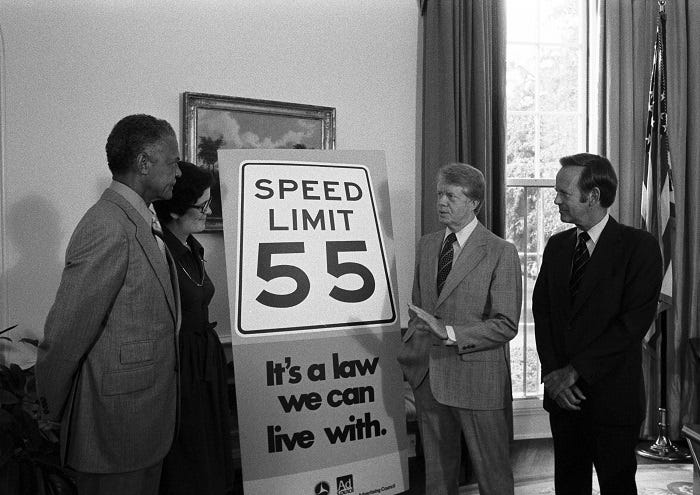
It’s obvious that Carter acted on this information. Remember the “Age of Malaise”, the hated “double nickle” speed limit, and the solar water heating panels on the White House roof.
It’s obvious that Carter tried to strike a balance between continuing fossil fuel use, while transitioning towards renewables. In conjunction with promoting the idea of a cultural shift away from a “culture of consumption” to one of sustainability.
However, Carter never spoke out about the CO2 levels.
He never said directly that the rising levels of CO2 in the atmosphere created a “potential impact on the environment of a climatic fluctuation of such rapidity (that it) could be catastrophic”.
He tried to get Americans to “do the right thing” but he never told them why.
He was not honest about about the information informing his policy choices.
People didn’t really know anything about the Earth’s Climate System in 1977. We had only been systematically studying it since the beginning of the “Geophysical Year” the UN had declared in 1957/1958. “Climate Science” was in its infancy.
1976 was a Crucial Year for the Climate
We crossed a significant tipping point that year. Even though the oceans were still cooler than our baseline, air/surface temperatures have continuously risen since then.
After 1976, the warming effect of our accumulated CO2 emissions was great enough to override the cooling effect of the earth’s oceans. Since 1976 we have been pumping heat into the Climate System faster than the oceans can process it.
Temperatures are rising because the planet cannot get rid of this heat fast enough. This is the same thing that happens to your car’s radiator when you hold down the gas. Heat comes in faster than it can go out, and the radiator heats up.
1976 was the year we started overloading the planet’s Climate System.
We didn’t know that.
The Oil companies were doing some private Climate Model Studies that strongly indicated increasing levels of CO2 would warm the planet. Nobody knew about that.
Recent records disgorged by Exxon in Senate investigations found that Exxon modeled and predicted global warming with ‘shocking skill and accuracy’ starting in the 1970s. Harvard and Potsdam researchers analyzed Exxon’s predictive “skill scores,” or how their predictions matched what actually happened.
Exxon disputed climate findings for years. Its scientists knew better.
They found that Exxon scientists were producing climate research in the 70’s and 80’s with an average skill score of 75 percent.
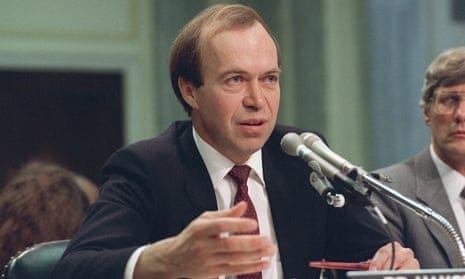
In comparison, NASA scientist James Hansen, who famously presented his global warming predictions to Congress in 1988, had an average skill score of 66 percent.
When Exxon said shit like this in the late 90’s.
“The science of climate change is too uncertain to mandate a plan of action that could plunge economies into turmoil,”
— Exxon ad, addressing proposals in the late 1990s for the U.S. to join an international climate accord (like the Paris Accord) at the time.
THEY WERE LYING. THEY HAVE BEEN LYING TO US FOR DECADES.
People were obsessed with the idea that another Ice Age was about to start.
This isn’t as stupid as it sounds. Things had been much colder in the 19th century. There had been a major heatwave in the late 30’s and early 40’s. Followed by a plunge in global temperatures.
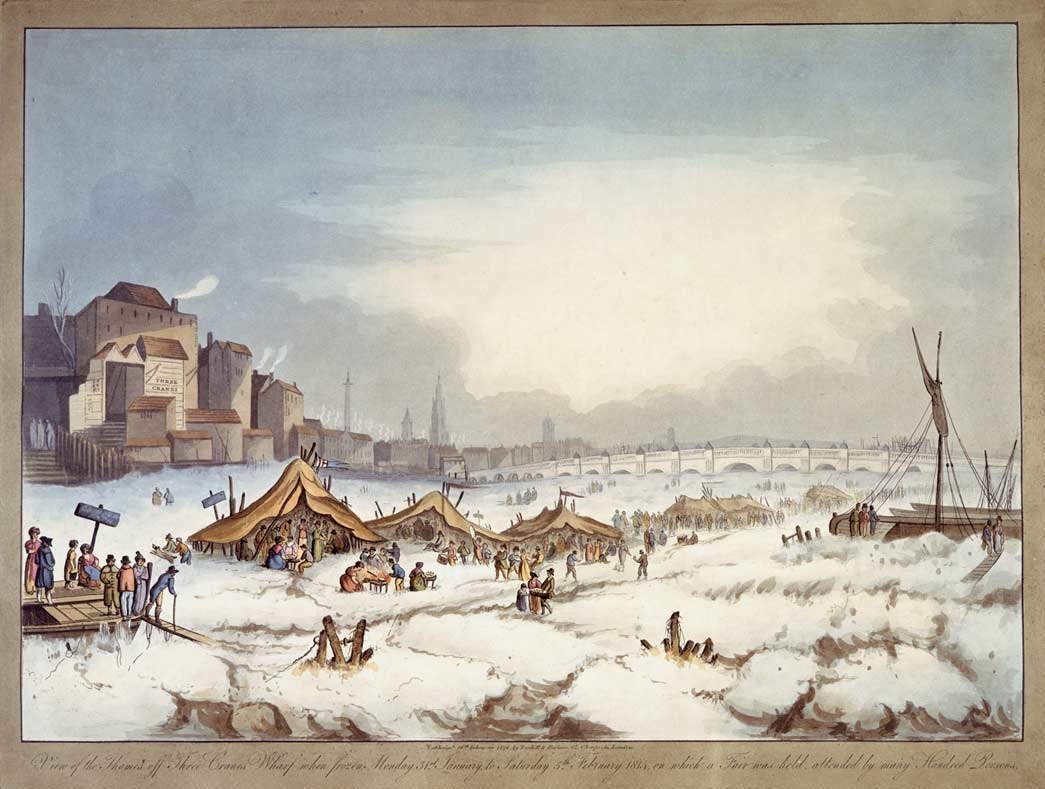
People born in the early 20th century grew up in a much colder, harsher climate.
Grandpa’s stories about how harsh the winter’s were when he was a boy, weren’t bullshit. The winters were harsher then.
The planet seemed to be warming up but the swings in temperature indicated a state of disequilibrium. So, was it going to get warmer or was it going to go back to being colder?
They really wanted to know the answer to this.
While things had been warming up, there was a lot of fear that they could turn cold again. This was amplified by some early findings in Climate Science research. Particularly, the discovery of a pattern in the periodicity of the Ice Ages.

It looks like Ice Ages happen roughly every 100,000 years.
This finding was seized on as proof of a theory put forth in the 1920’s by Serbian geophysicist and astronomer Milutin Milanković. In the 1920s, he hypothesized that variations in eccentricity, axial tilt, and precession combined to result in cyclical variations in the intra-annual and latitudinal distribution of solar radiation at the Earth’s surface, and that this orbital forcing strongly influenced the Earth’s climatic patterns.
The first analysis of the Greenland Ice Cores popularized the theory that the Climate System was driven by cycles in the Earth’s orbit, “Milankovitch Cycles”.
A lot of people believed that it meant another Ice Age was about to start. A lot of popular science fiction writers of the time, including Larry Niven and Jerry Pornelle, wrote science fiction novels about the coming Ice Age. This was very influential on how the next generation in the sciences perceived the climate.
If this seems like a stretch, have you heard of “The Ministry of the Future” by Kim Stanley Robinson? If you are the type of person who reads climate articles, I’ll bet you have.
Scientists are almost universally, science fiction fans. For a lot of them, it’s what steers them into the sciences. If you don’t understand how influential science fiction is on the sciences, you don’t understand the culture of science.
The idea that there was going to be a cooling trend in the Climate took root in popular culture. It was influential at multiple levels of society.
The first interpretation of the climate data being gathered, was that we were in a long term cooling cycle. Any warming being felt, was temporary. In the decades to come, it was going to get colder.
You still run into Climate Deniers making this argument. It influenced a whole generation.
Here’s a sample of a professional Climate Deniers work. They are still pushing the “Milankovich Cycles” idea.
The Great Famine of the 21st Century, A cautionary tale of our future climate
How the Sun Affects Earth’s Climate, Part I: Milankovich Cycles
How the Sun Affects Earth’s Climate, Part II: Solar Flux and Cosmic Rays
Carbon Dioxide Has Reached a Point of Diminishing Returns: The Greenhouse Effect Explained
It’s a perfect example of why first impressions can be misleading. Milankovitch Cycles are real. They clearly have a real effect on the Earth’s Climate. But, that effect is subtle and easily overridden by the effect of CO2 concentrations on the atmosphere.

We know this, because if you zoom out and look at the paleoclimate record on a longer timescale, the effect of the Milankovitch Cycles vanishes.

It’s really only noticeable for the last three million years. When CO2 levels have never gone much above 300ppm. For the last three million years we have been in the longest period of planetary glaciation in about 300 million years.
One of the important things this tells us, is that 180ppm seems to be the foundational level of atmospheric CO2 after geologic processes remove all excess from the system. The planetary level of CO2 never seems to fall below 180ppm.
None of this was known in 1976.
What we did know, was that we had to decide what we were going to do for energy in the decades to come.
What would you do?
If you were Carter?
1. Would you shut down the usage of fossil fuels?
The energy source for the whole economy. Forcing a crash transition to nuclear, wind, hydro, and solar power. Causing massive disruptions to every aspect of the economy and impacting the lives of everyone.
2. Would you take a more moderate approach?
Funding further research and studies of the Earth’s Climate System. Continuing to use fossil fuels while encouraging the development of renewable energy sources. Starting a gradual reduction in fossil fuel usage that could be accelerated if the research proved it was dangerous.
3. Would you ignore the problem completely?
Because “Some people” thought that the rising CO2 levels were meaningless and would have no perceptible effect on the global climate.
Carter, in effect, chose option two.
Remember the “Age of Malaise” and the solar water heating panels on the White House roof?
Carter tried to strike a balance between continuing fossil fuel use while transitioning towards renewables. In conjunction with a cultural shift away from a culture of consumption to one of sustainability.
The American public didn’t like it.
They had just experienced the pain of an energy shortage. It wasn’t pleasant.
Because we like cheap electricity, cheap air travel, cheap food, the freedom of our own personal automobiles, and cheap plentiful consumer goods. “We The People” were not going to ask very many questions about how this miracle was being accomplished.
The American Public didn’t want lectures on “sustainability”. They wanted CHEAP ENERGY.
They elected Reagan, and one of his first acts was the symbolic removal of the solar heating system from the White House roof.
In the emerging field of Climate Science, this political climate favored those who saw the planetary climate system as being resistant to change, strongly self correcting, and reactive only on centennial or millennial timescales.
During the 80’s Climate Science became dominated by these Climate Moderates.
Our Climate Models have incorporated their beliefs for the last 40 years. The Climate Science paradigm during that period has been one of slow gradual warming over a long period of time.
Our Climate Models are filled with embedded assumptions about the nature of the climate system that reflect their theories. Here’s an example, what do you think about clouds?

It seems intuitive that warming the planet would increase the amount of water vapor in the atmosphere and make the planet cloudier. This was seen as an example of the planet’s homeostatic bias.
The paradigm of the Climate Moderates was that warming the planet should increase the amount of clouds. Which would then cool the planet down. The planet was assumed to have a tendency towards climate self correction.
Those who argued against this theory were viewed as “alarmists”. Their models tended to end up in a runaway “greenhouse effect” with catastrophic temperature increases. The prevailing paradigm was that the alarmists could not be correct and they were pushed to the fringes of the field.
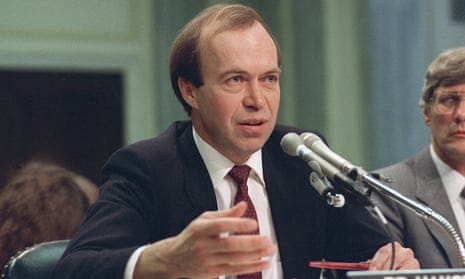
He still testifies before the Senate.
The Guardian did a “revisit” on Hansen in 2018 because he has become so marginalized in the public mind. “Deniers” have waged a decades long campaign to convince people that Hansen was completely wrong about Global Warming.
The Guardian’s conclusion.
30 years later, deniers are still lying about Hansen’s amazing global warming predictions.
Koch paychecks seem to be strong motivators to lie.
It turns out that the “alarmists” were right.
Using the CERES and Earthshine data a study published in the Proceedings of the National Academy of Sciences in July of 2021 found that it is 97.5 percent certain that changes in clouds brought about by climate change will amplify warming.
Observational evidence that cloud feedback amplifies global warming
Our Climate Models have been shaped by the ideas of the Climate Moderates for the last 40 years.
The physical evidence that we have accumulated during that time strongly indicates they underestimated the warming power of CO2 on the Global Mean Temperature by about 40%.
The paleoclimate data indicates they were wrong.
The ocean heat measurements indicate they were wrong.
The accelerating rate of warming indicates they were wrong.
All of the evidence indicates they are wrong, but they are still controlling the narrative about Climate Change. This happens all the time in science.
Science is a social activity. That’s the most important takeaway from Kuhn’s work.
Over time, the truth will prevail and the evidence will speak for itself. However, the process of getting there is a social one and it tends to happen slowly in human terms.
We don’t have any more time.
We are about to climb another “step” up the heat ladder.
That’s what’s happening right now. That’s what the UN means when they tell you that we “might” cross 1.5℃ of warming “temporarily” by 2026.
We are about to have a “heatwave”.
The Crisis Report - 33
It makes me realistic about what's happening with the Climate System. So, Last year I wrote a “Climate Assessment Report” in January/February. The report i…
Last year I forecast a “super El Nino” and record shattering heat in 23’/24’.
Last year I forecast that Putin would keep the war in Ukraine going because his endgame is the elimination of the Ukrainian people.
Last year I stated that China and Russia were allied and that the invasion of Ukraine is a joint project.
Last year I forecast that “global famines” are coming and hundreds of millions are going to starve in 23’ and 24’.
You might want to start thinking about getting ready.
This is my analysis.
This is what I see.
This is my “Crisis Report”.
— rc 05182023





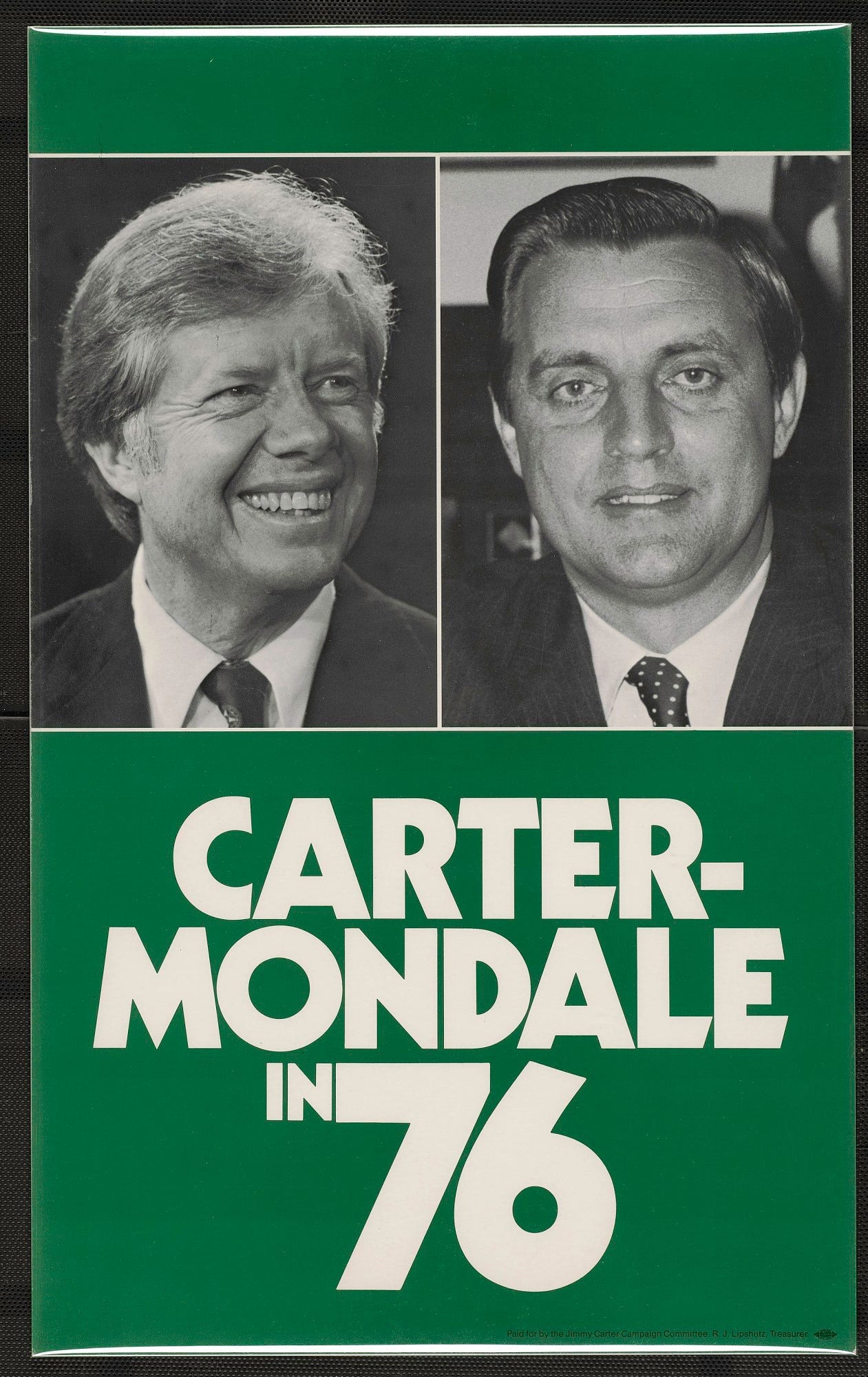
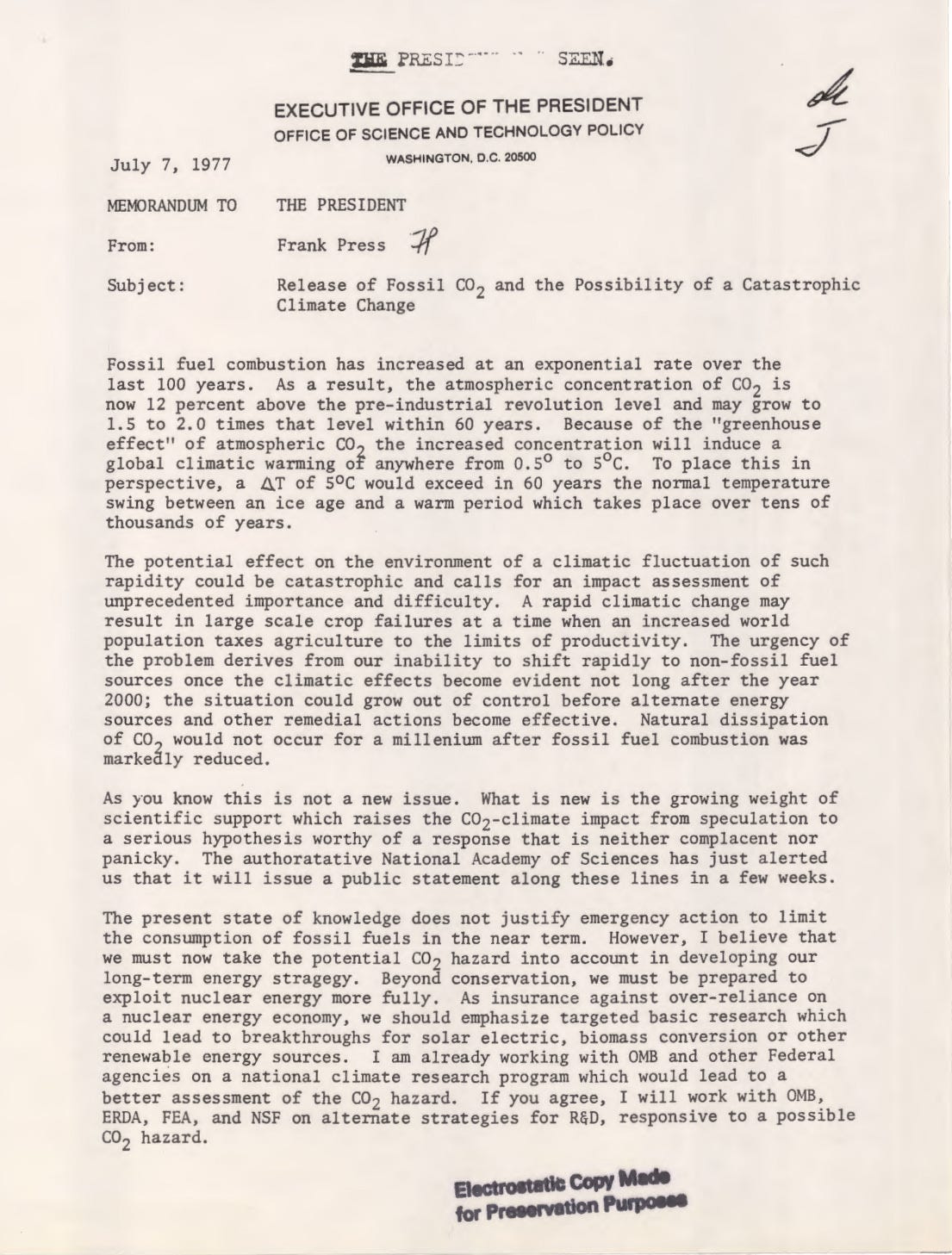
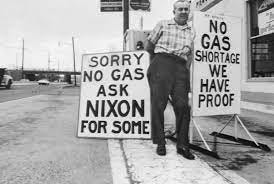
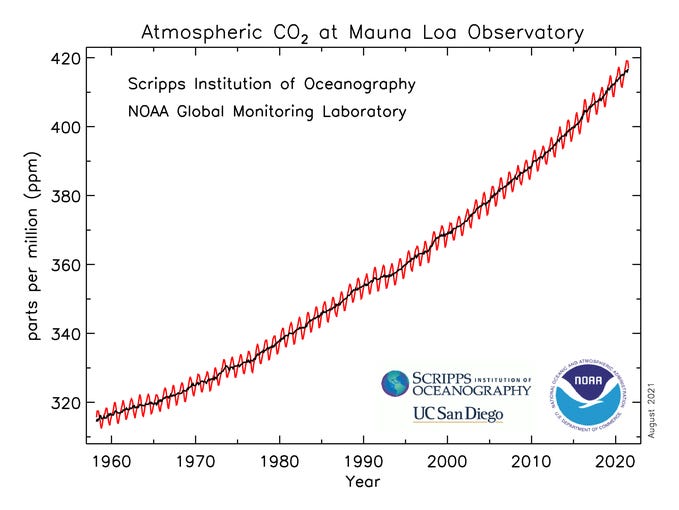
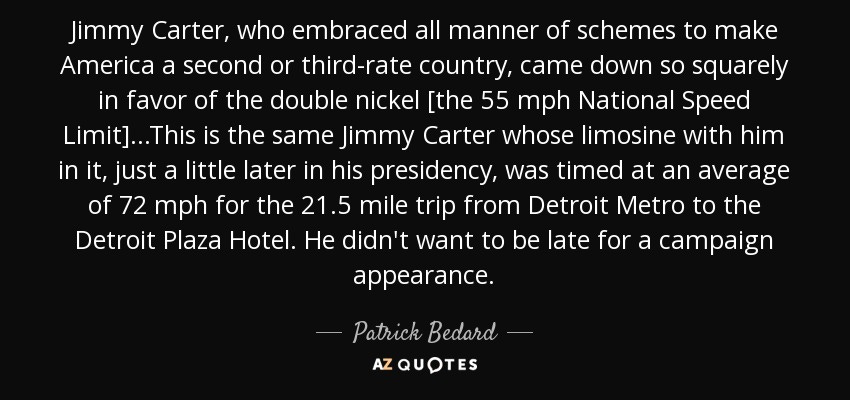


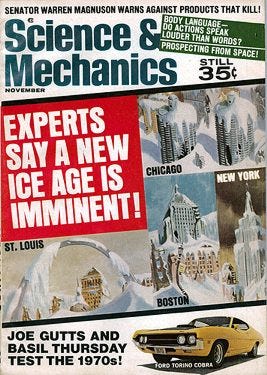
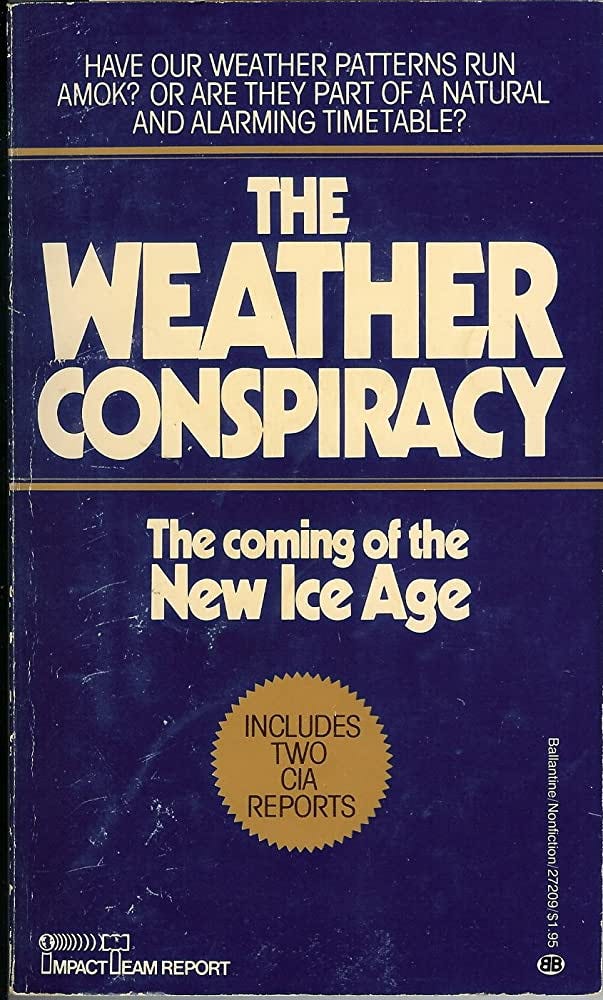
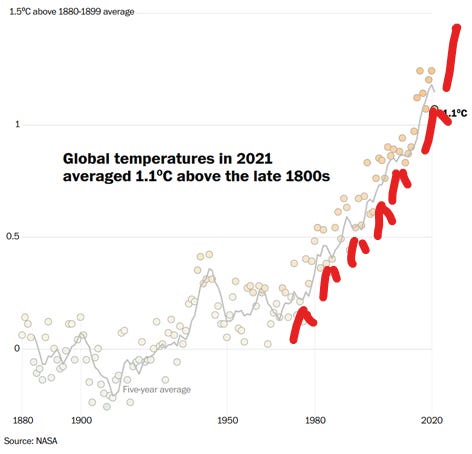

This is a great article. I like the way you write in short bursts of differently-formatted thoughts, much easier on my ADHD-addled brain than my own dense paragraphs of long sentences... Right on, I agree with your point on Carter, he could have been just the moderate we needed, if he hadn't faced such an ambitious and well-funded psy-op by the oil companies. He would be utterly inadequate today, but if he could have initiated a long-term program of investing in alternatives, we'd be in a different place today.
One key point on your reading of the 1970s "oil shock". When you look in to the history, the OPEC export ban was announced at a meeting with Americans in the room, literally during an OPEC meeting that "happened" to coincide with the outbreak of War in Israel. At the time, America was essentially a member of OPEC, since Chevron owned and operated Aramco. There were Americans at the table, negotiating on royalty rates, everyone wishing that oil prices were higher, right when the war conveniently broke out in Israel. There was never a shortage of oil; the market was already globalized, and some Aramco oil was diverted to Asia while more oil came into the U.S. from South America. You write that OPEC was "Punishing us for our support of Israel in the Arab-Israeli Wars, they had caused fuel prices to soar and Americans to have to stand in line for gas." If they were punishing us, they were doing it with our own countrymen telling them what to do. The American oilmen convinced them it would be in everyone's best interest to do something to raise oil prices.
It was a carefully staged piece of historical theater that was designed to rally Americans to the twin causes of Israel and oil. It was a psy-op by oilmen, and as you point out, put them in a position to leverage American's anger at oil prices to OPPOSE any interference from anyone like Carter, to utterly run over the nascent environmentalists, who were, as you point out, mostly on their own payrolls anyway at the time.
The climate "moderates" want to talk about the hope of organizing political pressure on industries and government to accept responsibility and make changes. None of them speak of ending our capitalistic growth-based lifestyle.
That's too "radical." Better to hold on to prestige and institutional positions. We just need to make everything electric and solar and slap heat pumps on everything. Just green-up capitalism! Problems solved!
Nothing is more radically destructive than our cultural lifestyle. And moderating the catastrophe is cruel insanity from the scientists who know better, but for one reason or another, refuse to speak the full truth.
Thanks for speaking the unspeakable.